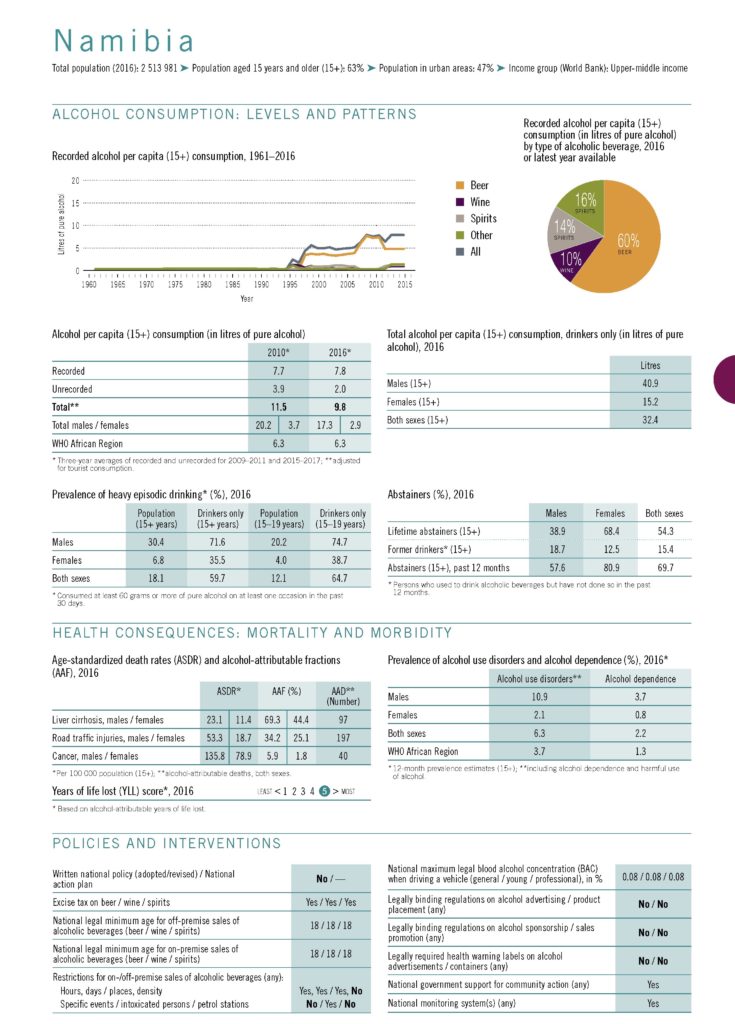The ban on advertising, promotion and sponsorship of alcohol and other dependence-inducing substances in Namibia is one of the many aims and objectives of the proposed bill titled ‘The Prevention and Treatment of Substance Use’.
Another major aim of the bill is to establish a National Drug Control Commission and regional substance use control forums in the country. The commission and the forums will be tasked with:
- Registering all service providers – producers, importers and retailers who distribute substances targeted under the proposed law; and
- Establishing the administrative and regulatory framework “within which service providers must provide their services”.
The goal is to provide a comprehensive national response to reduce the harm caused by alcohol products and other substances in the country.
The Ministry of Health and Social Services is leading the bill. Stakeholders and affected industries were called to submit input from March to September, 2021.
According to Minister of Justice Yvonne Dausab, the bill has not been submitted to the Cabinet yet, or to the Cabinet Committee on Legislation for consideration. She said the bill has undergone various changes, which could eventually affect the form of the proposed law. Civil society worked to help, protect the development fo the bill against interference of the alcohol industry and other vested interests.
Big Alcohol opposition despite alcohol harm in Namibia
Big Alcohol lobby front groups are already pushing back against the bill. The Self-Regulating Alcohol Industry Forum (Saif) has opposed the alcohol advertising and promotion ban. The lobby group claimed that if this bill was passed they would have to stop sponsorship of various sectors, such as sports and youth development.
But why is Big Alcohol in Namibia claiming that their marketing is essential for the youth development sector?
Alcohol should not have a place in sports or youth in the first place. Through sponsoring sports events the alcohol industry attempts to pass off alcohol as healthy. In fact, pro-sports stars, like footballer Paul Pogba, have acted against Big Alcohol exploitation of the sport they love for driving sales and profits.
The renowned WHO Bulletin suggested that the sports industry embrace a socially-responsible approach to commercial sponsorship and advertising, an approach which emphasizes the future health of sports’ fans, families and communities – free from alcohol promotions.
The alcohol industry specifically targets young people with their products to maximize profits at the cost of health. The consequences are grave. As the World Health Organization (WHO) reports, about two thirds (64.7%) of the Namibian adolescents between 15 to 19 years who use alcohol, engage in binge use. According to the WHO, Namibia is one of the countries with the highest number of years of life lost because of alcohol.
In the African region, the alcohol industry has been making inroads for some time now. The growing middle-class and young population is seen by the industry as a market to increase industry profits. The weakness or complete absence of sound public health oriented alcohol policy systems is exploited by the Big Alcohol to heavily advertise and sell cheap alcohol to hook youth to the products and brands.
These are precisely the reasons why this bill by the Namibian government is important. The proposed advertising, promotion and sponsorship ban is one of the most cost-effective Best Buy policy solutions to prevent and reduce alcohol harm, as recommended by the WHO. Recently, African region community activists called on their leaders to prioritize alcohol policy solutions to protect people from harm caused by the products and practices of the alcohol industry. ‘The Prevention and Treatment of Substance Use’ bill by the Namibian government could do exactly that if adopted, implemented, and protected from vested interests.

